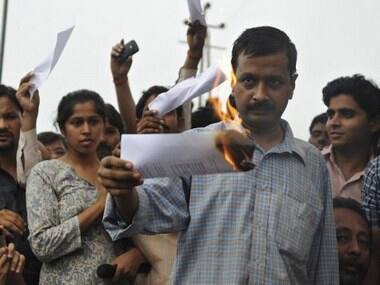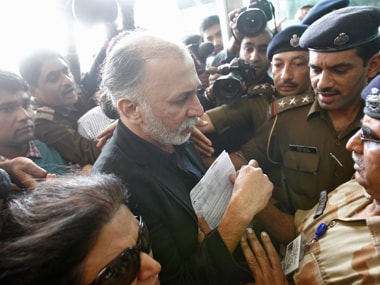London: Around this time last year, had anyone ventured to predict some of the things that happened in India in 2013 they might have been accused of suffering from the Alice in Wonderland syndrome and advised to get real. It was a year full of surprises that, among other things, saw old rules of politics dramatically rewritten; Indian diplomacy suddenly acquire muscle; and a high-profile self-appointed bastion of ethics and moral standards fall to hubris. Some of the events that grabbed headlines were so unpredictable that even the best crystal ball in the market may not have foreseen them. Here are five events, chosen at random, that made 2013 a memorable year in more senses than one. Rise of Aam Aadmi Party: It was the seminal political development of the year that sent alarm bells ringing through the establishment while spawning a new mood of optimism among ordinary Indians who had started to lose faith in democratic change. [caption id=“attachment_1307145” align=“alignleft” width=“380”]  The rise of Kejriwal’s AAP was the biggest surprise of Indian politics.[/caption] AAP’s sensational debut in Delhi elections on the back of its promise to change the old ways of doing politics and usher in a new era of transparency and accountability got even hardened cynics talking. The buzz word became “change” replacing the familiar weary sense of hopelessness. Last year, who would have thought that a fledgling party with few resources and derided as a bunch of clowns and rabble-rousers would soon be running Delhi. Although Arvind Kejriwal and his team always maintained that they were going to cause an “earthquake’’, privately, even they must have been surprised by the scale of their achievement. The impact of AAP’s triumph is already evident with both the Congress and the Bharatiya Janata Party scrambling to take a leaf from its book. Suddenly, the aam aadmiis every politician’s darling. Gung-ho diplomacy: Surrounded by a noisy and hostile TV studio audience that included two high-profile ex-diplomats, the New York Times man struggled to get a word in. And, finally, when he managed to be heard, he said he said he was surprised by India’s strong reaction in the Devyani Khobargarde case pointing out that New Delhi had not reacted so aggressively even when Pakistan killed its soldiers and China walked all over Indian territory. India’s tough response over the arrest and subsequent humiliation of its New York-based diplomat for allegedly breaking US wage laws was indeed unexpected. It went beyond the usual rhetoric with retaliation coming in the form of security barriers being removed from outside the US embassy in Delhi, and an inquiry ordered into wages paid to Indian staff employed there. When was the last time did we see India confront America with such gusto? It was the year when Indian diplomacy went gung-ho. If not in policy terms, at least in making its protests taken more seriously. The bark got a little more bite, and the Americans were not the only one to get a taste of it. Earlier in the year, Italians were forced into a humiliating climb-down after India threatened to detain its Ambassador if it did not return two marine guards to stand trial for allegedly killing two Indian fishermen. The guards, who were in jail, were allowed to visit Italy to vote in general elections but once there, the Italian government refused to send them back. However, after India kicked up an almighty row Italy promptly reversed its stand. Having tasted blood once, MEA is on a roll. Tehelka scandal: It was one of the saddest events of 2013 and illustrated the perils of taking on the mantle of being the society’s moral conscience. A campaigning newspaper which took pride in holding mirror to others was consumed by its own hubris. The scandal, involving Tehelka’s high-profile editor Tarun Tejpal, represented some of the worst elements of a sexist society, notably blatant abuse of male authority and sexism at workplace. Tejpal, who is in jail awaiting trial, allegedly sexually assaulting a junior female colleague who regarded him as a father figure. He and his organisationthen attempted a crude cover-up by trying to pass off his behaviour as a “banter’’ and, typically, suggesting that the victim was protesting too much. Its uber-feminist managing editor Shoma Chaudhary tied herself in knots trying to defend the indefensible and was ultimately forced to quit. [caption id=“attachment_1283557” align=“alignright” width=“380”]  Tehelka Editor Tarun Tejpal. Reuters[/caption] While Tehelka thrived by aggressively pursuing women’s issues, when it came to protecting its own female staff it was found to be shockingly negligent. It had not even bothered to follow the Supreme Court guidelines on sexual harassment at workplace requiring all establishments to set up an in-house mechanism to deal with it. That such an incident should have happened –and of all places at Tehelka—barely months after Parliament passed a tough anti-rape law shows how difficult it is going to be to fight deep-seated sexism in India. LK Advani’s fall: 2013 saw an abrupt end to the Advani era in frontline politics. While Narendra Modi’s ascent to political stardom was widelyexpected, what was not expected was that L. K.Advani, once hailed as the BJP’s strongman with prime ministerial ambitions, would suffer the kind of humiliation he did at the hands of his own one-time loyalists. His “iron man’’ image was dealt a mortal blow as he lost the internal power struggle to the Modi faction after his former mentors in the RSS disowned him. As though that was not enough, the BJP’s media managers took to the airwaves to declare Advani as “history’’. A year can indeed be a long time in politics. Congress conversion: Last but not the least expected was the Congress party’s avowed conversion to clean politics. In a dramatic u-turn orchestrated by Rahul Gandhi, first it withdrew an ordinance that would have made life easier for convicted politicians; and, then, with uncharacteristic alacrity pushed through Parliament the long-delayed Lok Pal bill declaring its “commitment’’ to fight corruption. Whew! What a year!
From the transformational rise of Arvind Kejriwal’s AAP to the fall of Advani and Tarun Tejpal - 2013 was a year of unforgettable surprises
Advertisement
End of Article


)
)
)
)
)
)
)
)
)



